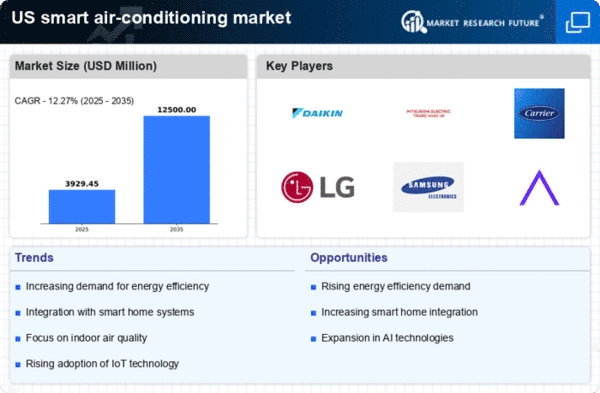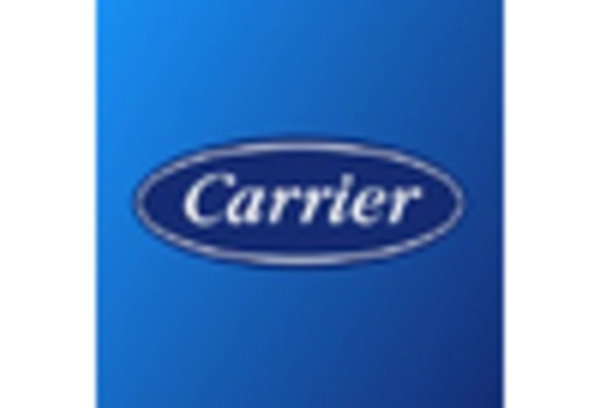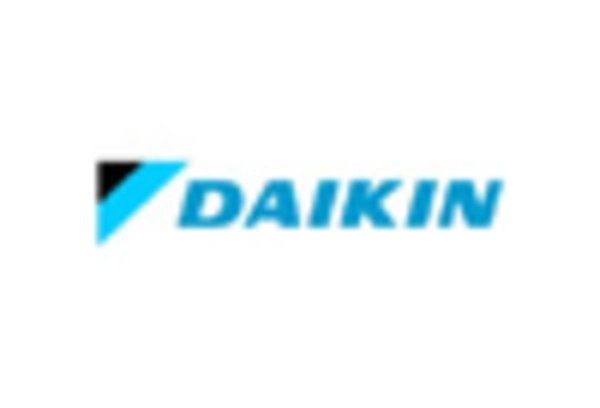Rising Consumer Demand for Automation
The smart air-conditioning market is experiencing a notable surge in consumer demand for automated solutions. As households increasingly seek convenience and efficiency, the integration of smart technologies into air-conditioning systems becomes paramount. According to recent data, approximately 60% of consumers express a preference for smart home devices that enhance comfort and control. This trend indicates a shift towards systems that can be remotely managed via smartphones or voice-activated assistants. The growing awareness of energy conservation and the desire for personalized climate control further drive this demand. Consequently, manufacturers are compelled to innovate and offer advanced features, thereby propelling the smart air-conditioning market forward.
Integration of Renewable Energy Sources
The integration of renewable energy sources is emerging as a pivotal driver in the smart air-conditioning market. As the U.S. transitions towards sustainable energy solutions, the demand for air-conditioning systems that can operate efficiently with solar or wind energy is on the rise. This trend is particularly relevant in regions with abundant renewable resources, where consumers are increasingly looking for ways to reduce reliance on traditional energy grids. Smart air-conditioning systems equipped with energy management features can optimize energy usage based on the availability of renewable sources, potentially lowering energy costs by up to 40%. This alignment with renewable energy initiatives is likely to enhance the attractiveness of smart air-conditioning solutions, further propelling market growth.
Environmental Awareness and Sustainability
Growing environmental awareness among consumers is a driving force in the smart air-conditioning market. As individuals become more conscious of their carbon footprint, there is an increasing preference for energy-efficient systems that utilize eco-friendly refrigerants. Reports indicate that nearly 70% of consumers are willing to invest in sustainable technologies, which positions smart air-conditioning systems as a viable solution. These systems not only reduce energy consumption but also contribute to lower greenhouse gas emissions. The emphasis on sustainability is prompting manufacturers to prioritize eco-friendly designs and materials, thereby aligning with consumer values and enhancing market competitiveness. This shift towards sustainability is likely to shape the future landscape of the smart air-conditioning market.
Technological Advancements in HVAC Systems
Technological advancements play a crucial role in shaping the smart air-conditioning market. Innovations such as IoT connectivity, machine learning algorithms, and advanced sensors are revolutionizing HVAC systems. These technologies enable real-time monitoring and predictive maintenance, which can lead to a reduction in operational costs by up to 30%. Furthermore, the integration of AI allows for adaptive cooling strategies that optimize energy usage based on occupancy patterns. As these technologies become more accessible, they are likely to enhance the appeal of smart air-conditioning systems, attracting both residential and commercial consumers. This evolution in technology is expected to significantly influence the growth trajectory of the smart air-conditioning market.
Government Initiatives and Energy Regulations
Government initiatives and energy regulations are significantly influencing the smart air-conditioning market. Various states have implemented stringent energy efficiency standards aimed at reducing overall energy consumption. For instance, the U.S. Department of Energy has established guidelines that encourage the adoption of high-efficiency air-conditioning systems. These regulations often come with incentives, such as tax credits or rebates, which can lower the initial investment for consumers. As a result, the market is witnessing an increase in the adoption of smart air-conditioning solutions that comply with these standards. This regulatory support not only fosters innovation but also enhances the market's growth potential by making smart systems more financially accessible.















